🕒Estimated Reading Time: ~11 minutes
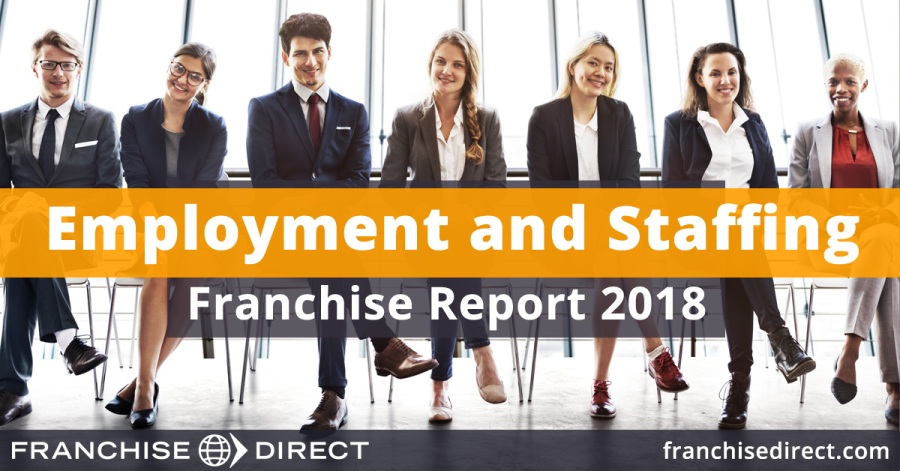
Overview of the Employment and Staffing Industry and Growth Trends
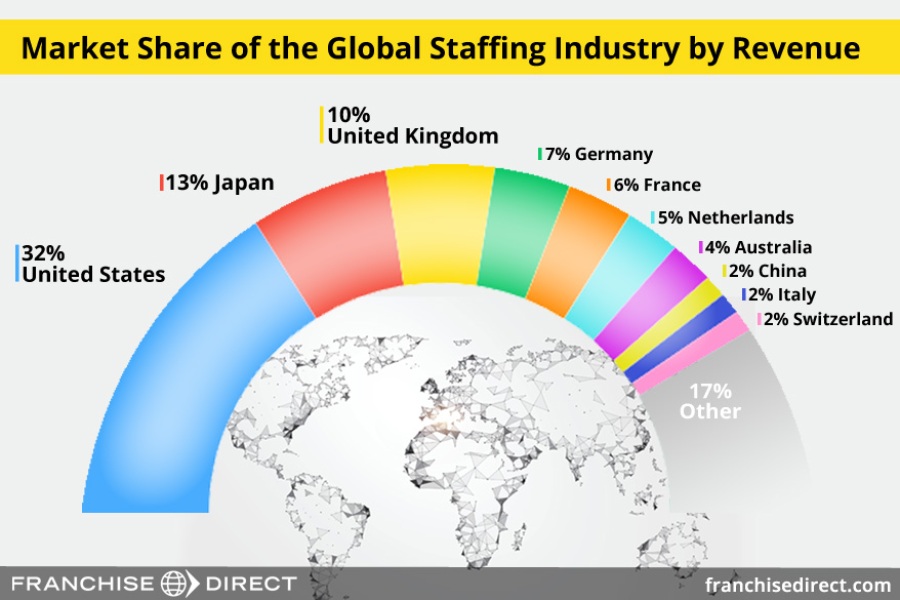
Market Share of the Global Staffing Industry by Revenue (Source: Statista)
As you can see above, the United States is the world’s largest market for the employment and staffing industry, with estimated revenue of over $140 billion annually. Franchises within the employment and staffing industry list employment vacancies, refer job applicants to potential employers and assist companies with employee recruitment and placement. Some franchises also provide payroll and other human resources assistance.
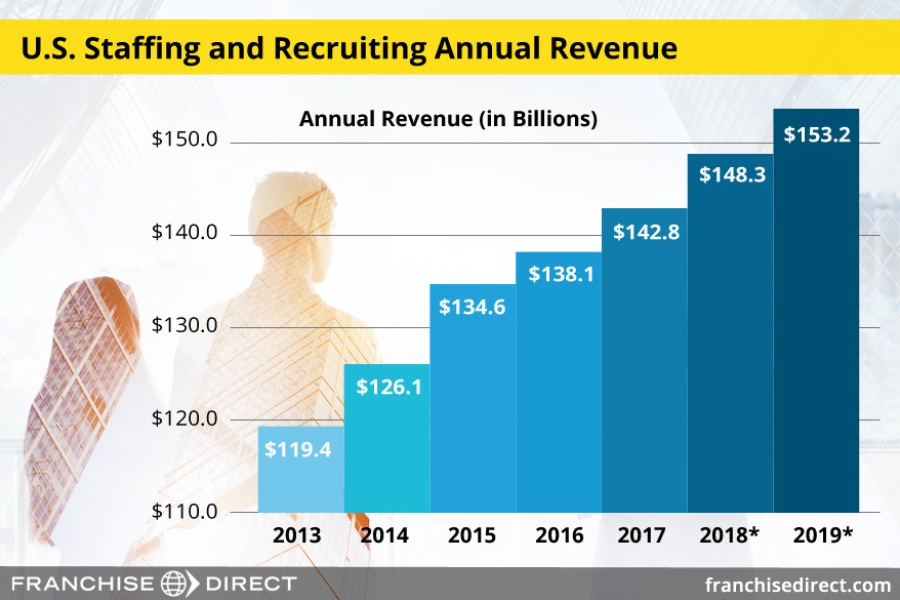
U.S. Staffing and Recruiting Annual Revenue (Source: Statista)
*Estimate
According to the American Staffing Association, “Since the recovery began in July 2009, staffing employment has been growing three and a half times faster than the economy and seven times more rapidly than overall employment.” The growth of the industry has been influenced by many factors. But according to Jason Leverant, President and COO of the AtWork Group, two factors stand out.
The first is generational demand. “Generationally, Millennials are more interested/accepting of flexible/contingent work and indicators are showing that the next generation of the workforce is showing even more interest in controlling their work schedules,” he says.
The second factor, a client mindset shift, is closely related to the generational demand. As Jason says, “Clients have also realized that the benefits of a flexible workforce to balance their staffing with the ebb and flow of their own business models helps them be more efficient and profitable. This mindset shift across the board has really driven consistent growth over the last 10+ years.”
Artificial Intelligence Becoming a Bigger Part of the Employment and Staffing Industry
“[Artificial intelligence] will no longer be a buzzword or some next-generation technology that was utilized in a Hollywood blockbuster movie.”
~ Recruitment software company Talentnow, May 2018
The ability to keep up with trends that will impact future profitability is one area being a franchisee is advantageous. In addition to the generational and mindset shifts referenced above, another trend prospective franchisees in the employment and staffing industry should pay attention to is the evolution of technology in the field. Employment and staffing franchises commonly have proprietary software systems that aid their franchisees in efficiently running their businesses, as well as being a valuable resource in staying ahead of the curve in terms of where business trends are headed.
However, it doesn’t hurt for franchisees to have some insight into where the market is going for themselves. One of the hottest areas in staffing technology right now is artificial intelligence (AI), and industry professionals see a lot of potential in its use.
Currently, recruiters spend a significant portion of their time reviewing resumes for potential candidates for jobs. AI could potentially be used to automate certain functions, freeing up recruiters to focus on other, more income-producing tasks. One of these functions could be the screening of resumes for candidates that match job requirements.
As Staffing Industry Review notes, “[AI’s] potential includes use of machine learning and natural language processing to examine vast amounts of data in order to find workers or better match them with jobs. AI is able to take ‘unstructured data’ to find people who have the right skills but whose resumes don’t match the key words of a job description.”
Furthermore, industry analysts at Talentnow feel that using AI “will aid in eliminating subconscious bias from having any part to play during the interview process resulting in the selection of a diverse workforce.”
The use of AI within the employment and staffing industry is also expected to become more prominent in creating chatbots, computer programs that simulate human conversation (think Alexa or Echo devices) that can automate the initial communication and screening of candidates. Chatbots are also gaining in use after an employee is hired to help answer basic HR questions.
As when virtually all new technology is introduced, people tend to wonder if it will render them obsolete at some point in the future. To this worry, industry professionals and analysts say not to fear. “I don’t believe that AI’s intention is to replace recruiters,” Carisa Miklusak, CEO of tilr, a job-matching mobile app says. “What AI is intended to do is to provide more data and more exact results.” AI can do this by taking the more replicable and monotonous tasks off of people’s to-do-lists, leaving the recruiters to do the more human elements of determining if someone is a good fit for a job.
Employment and Staffing Franchises Go Beyond the General
Most often, when people think about employment and staffing they think about general office and administrative positions. However, employment and staffing franchises operate in virtually all industries, and broader industry trends can point you towards which areas will grow next.
For instance, according to The Atlantic, healthcare is now the United States’ largest employer. What does that mean for employment and staffing franchises? More employers are looking to engage them to find talent.
Currently, healthcare makes up only nine percent of overall employment through staffing agencies. But the growth of the healthcare industry means specialized franchises like ATC Healthcare and BrightStar Care will see—and in cases, have already seen—increased demand for their services. Franchises within this specialty help home care, hospice, and healthcare companies find nurses, therapists, aides, companions and other healthcare professionals.
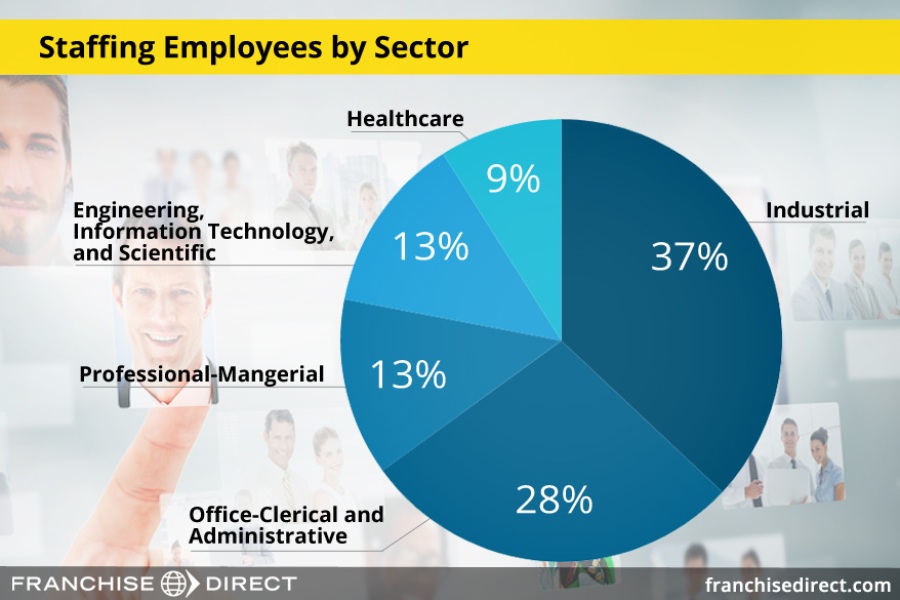
Staffing Employees by Sector (Source: American Staffing)
Beyond healthcare, the employment and staffing franchise industry has seen the rise of several additional specializations in the past few years.
For example, NexGoal caters to former Olympic, professional and college athletes, helping them transition into business roles that take advantage of the skills they gained through high-level athletics. Another specialty employment franchise is Link Staffing, which distinguishes itself from competitors by offering services in the crafts and trades, since “few employment placement services businesses offer services [in this specific area],” according to its franchise disclosure document.
Specializing in one area allows franchisees and their employees to develop the expertise to match applicants for certain jobs to companies quicker than in a franchise than one more general in scope—a huge plus in fields that involve special skills such as healthcare and trade work. And among the positives for franchisees, if clients feel more secure that the franchise knows how to address their specific need, there’s a good chance they can draw repeat and referral business.
Employment and Staffing Franchise Investment Information
Please note: the provisions and fees illustrated below (and in linked pages) are some of the most common and not a complete listing. Please review the franchise disclosure document (FDD) of a franchise for all of the provisions and fees related to investing in that particular franchise.
What Kind of Person Would Do Best In This Industry?
“A background in sales or business development always helps someone entering the staffing industry,” Jason Leverant says. “We’ve found that people who have successfully led and motivated teams also work out really well as they can coach/develop their sales/recruiting teams more effectively than most. If you have an outgoing personality and a willingness to work hard to find success they you’ll do great in the staffing industry!”
If you’re pursuing a franchise in the employment and staffing industry, you can’t be afraid of sales and sales-type work. When you boil the industry down to its basic function, franchisees in this industry are B2B sales and consulting companies tasked with building relationships with small and medium-sized businesses in their local communities, and then helping connect job seekers with those businesses.
And don’t be afraid if you don’t have previous human resources (HR) experience.
“We’re not necessarily looking for HR folks because we handle all of the back office while the franchisee focuses on just the relationship side of the business,” confides David Lewis, vice president of Express Employment Professionals. “Candidly, [HR experience] can work against someone if they fashion themselves a HR ‘wonk’ and they want to deal with the administration all day because that’s not the franchisee spends their time doing. They’re connecting people. We are fancy matchmakers. We just do it with jobs instead of love.”
Regulations for the Franchise
Though the franchisor will help, franchisees are primarily responsible for making sure they are in compliance with all local, state, and federal laws that apply to the operation of a personnel services franchise, including government regulations relating to EEOC, OSHA, discrimination, employment, sexual harassment and more. In addition, some states require the licensing and/or bonding of agencies in this field along with the agencies’ consultants.
Here are some other laws you might have to adhere to as a personnel service franchisee:
- Federal civil rights laws, including the Civil Rights Act of 1964 (Title VII), the Age Discrimination in Employment Act (ADEA), and the Americans with Disabilities Act (ADA) prohibit unlawful discrimination in classifying and referring applicants for employment. Many state human rights laws have similar regulations.
- The Fair Labor Standards Act, federal, state and municipal minimum wage laws, the Occupational Safety and Health and Immigration laws will apply to the franchise.
- The Federal Immigration Reform and Control Act prohibits companies in the industry from knowingly referring an illegal alien for employment in the United States.
- The Federal Fair Credit Reporting Act has regulations on reference checking applicants for employment.
Franchisees should consult with an attorney concerning these and other local laws and ordinances that may affect the operation of their franchise.
Initial Investment
Franchisors offer estimates in their FDD based upon their experience establishing, and in some cases operating, units. However, prospective franchisees should remember these estimates are just that—an estimate. Prospective franchisees should review the figures presented with a business advisor, taking into consideration their unique circumstances, before entering into a franchise agreement.
The following graphic provides the initial investment range associated with opening five employment and staffing industry franchises. These ranges come from the FDDs of each respective franchise dated 2018.
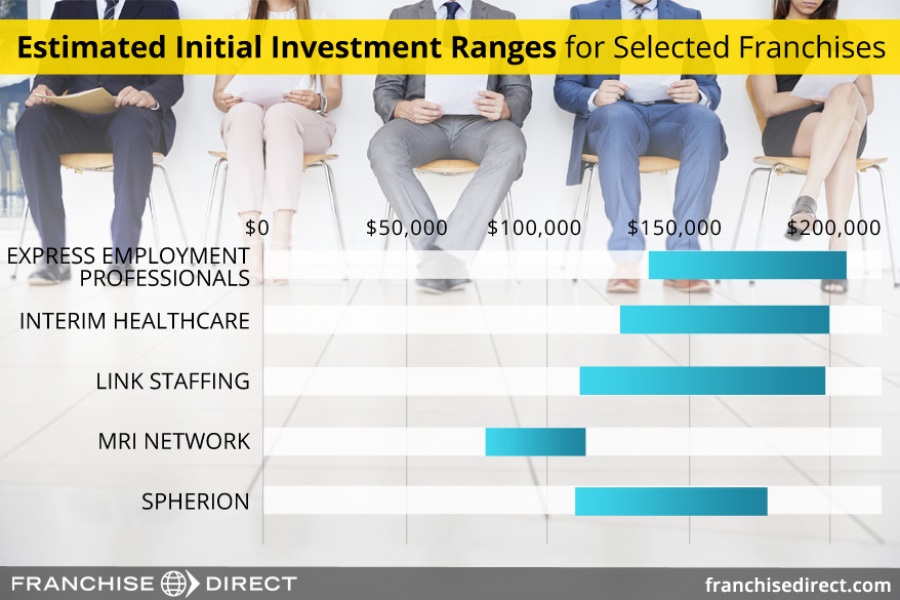
Estimated Initial Investment Ranges for Selected Franchises
Ongoing Fees
In addition to what you spend to start, there are a number of expenses required for the successful maintaining of the business. There are also a number of ongoing fees that are specific to being a part of the franchise system.
The most common ongoing fee common to franchises is a royalty. Royalty fees are assessed for the continued use of the franchisor’s trademarks and patented processes. Examples of how royalties are collected can be seen below for the five franchises featured above.
The amounts presented are as they appear in the franchise’s 2018 FDD.
| Franchise | Royalty |
| Express Employment Professionals | 40% of the Gross Margin for the Flexible Staffing portion of the business and 8% of Gross Receipts of the Career Placement portion of the business; if franchisees become opt-out franchisees: 8% of the Total Billings. |
| Interim Healthcare | 3.5% of Medicaid sales; 4.5% of Medicare sales; 5.5% of all other sales; minimum weekly payment of $100 |
| Link Staffing | 8% of Gross Billings or 34-42% of Gross Margin, whichever is greater |
| MRI Network | 9% on the first $500,000 of Net Cash-In; 7% on Net Cash-In from $500,001 to $1,000,000; 5% on Net Cash-In from $1,000,001 to $2,000,000; and 3% on Net Cash-In that exceeds $2,000,000. There is a minimum royalty obligation beginning in the 3rd full year of operation of $12,000 adjusted for changes in the Consumer Price Index. |
| Spherion | N/A. The franchisor pays franchisees their commission on (and it retains the balance of) the Temporary Gross Profits for the Accounting Period. The franchisor pays franchisees 75% and retains 25% of the Temporary Gross Profits. |
Royalty Breakdowns for Selected Franchises
(More Investment Info for Each Franchise Can Be Found at the Links in the Table)
For certain franchises, such as Express Employment and Link Staffing above, you’ll see a term that isn’t a part of franchise royalties in many other industries: gross margin. Gross margin is the amount remaining after employee costs (wages, payroll taxes, workers’ compensation, and more) are deducted from gross billings. Gross margin is more prevalent with employment and staffing franchises because sometimes franchisees will outsource elements of the payment process to a franchise’s corporate accounting department in order to streamline and make processes less complicated for franchisees—a setup that many industry professionals encourage for maximum efficiency.
Other regular ongoing fees include charges for marketing, software and technology, and more. In addition to regularly assessed fees, other fees charged by franchisors on an “as needed” basis include audit fees or costs for additional, non-mandatory, training.
Prior to investing, prospective franchisees should do their research and carefully review a franchisor’s FDD for more detailed information on all systems, procedures and costs. It’s important to note that while many ongoing costs are detailed in the FDD, there are some costs inherent to business ownership, like employee wages or utility costs, that aren’t.
Please visit our page Employment and Staffing Franchises for a listing of franchises in this industry seeking franchisees.














